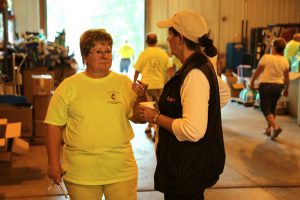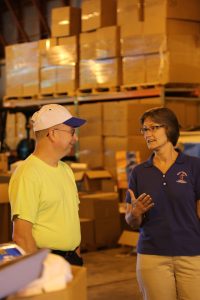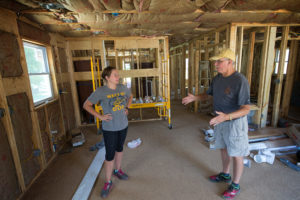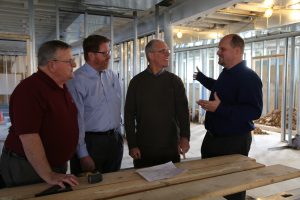We are very grateful for numerous partners throughout the region in response to the storms and flood disaster of June 23, 2016. Partners have engaged in different portions across all areas of disaster response.
Some partners engage in early response activities such as mucking out, wielding chain saws, cleaning out, removing debris, and offering spiritual care. Others have teams that assist with demolition of destroyed homes. Some bring meal wagons to feed hundreds of people at a time. Others have resources for funding emergency response and/or recovery. Some organize volunteer work teams. Still others conduct disaster case management.
Unique in reaction to the 2016 disaster is the engagement of West Virginia Conference of The United Methodist Church (WVUMC). While other partners offer different elements of disaster response components, the WVUMC covers it all and follows the United Methodist Committee on Relief’s (UMCOR) pattern of “first in, last out,” meaning “We’re here for as long as it takes.”
The WVUMC disaster response includes:

Sue Lowther and Cathy Earl, UMCOR, at New Vision Depot
Spiritual care: Rev. Sue Lowther provides training for clergy and qualified others to be prepared to enter the disaster zone and offer a listening ear for people who are stunned and overwhelmed by what the disaster has done. The training is general in spiritual care. It is not evangelistic, proselytizing, or specific to United Methodism or even any particular faith. The goal is to prepare people to be safe listeners who create comfortable spaces for people to tell their stories

Dan Lowther meets with Bishop Sandra Steiner Ball at New Vision Depot
Early response training: Rev. Dan Lowther offers UMCOR certified training for individuals and teams entering a disaster zone. The training prepares individuals and teams to work efficiently and safely once first responders allow entry. Once certified, participants need to be recertified every two years.
Disaster supplies: The WV Conference’s New Vision Depot is a supply center located in Beaver, WV. It is managed by the WVUMC Disaster
Response Coordinators, Rev. Sue and Rev. Dan Lowther. They receive and process donated items such as flood buckets, health kits, cleaning tools, paper products, hygiene supplies, drinking water, meals-ready-to-eat, and fans. A donated camper is being equipped to serve as an emergency response vehicle that can sleep part of a team, launder work clothing, and serve as a tool and work shop. A flat-bed truck delivers supplies throughout the region.
Disaster case management: Grace Msisha and Miranda Nabers are our Disaster Case Managers (DCMs). They seek and receive referrals of clients whom after being vetted are helped to establish a recovery plan. They then help survivors move through the plan to recovery. Moving through the plan often means collaborating with

Miranda Nabors and the Rev. JF Lacaria check on the progress of a new home being constructed for a survivor whose home was destroyed during June 2016 flooding in Clendenin, W. Va. Both work for the disaster recovery ministry of the West Virginia Conference of The United Methodist Church. Photo by Mike DuBose, UMNS.
our construction coordinators for building needs and presenting cases to the statewide unmet needs committee for funding partnerships. Their work helps us stretch our donated funds for construction material, appliances, furniture, and other items needed for a home to be safe, secure, and sanitary.
Construction coordinators: Buck Edwards and Chad Faris are our construction coordinators who work closely with the DCMs to determine what is needed for a survivor’s recovery. Construction work ranges from minor removal and replacement of damaged material to substantial rehabilitation of a flood-damaged home to complete new construction to replace a home that was destroyed in the flood. They prepare cost estimates for materials and supplies and supervise volunteer in mission work teams who provide the labor for recovery activity.
Volunteers in Mission: Rev. David Stilgenbauer is our conference Volunteers in Mission (VIM) coordinator who recruits and places VIM teams throughout the region. Several of our ecumenical partners have volunteer teams, but they rely on us to settle them at a host site and to provide meaningful work for them.
Volunteer team host sites: Throughout the region, WVUMC has churches that are equipped with kitchens, sleeping space, and showers to host work teams. Since some conference funds were available, we matched the expenses of shower installation of our WVUMC churches in strategic locations with their commitment to host teams as we send them. We are very grateful for our host site pastors and lay folk who enable this to happen.

Jack Lipphardt, Jeff Taylor UM Foundation President, JF Lacaria and Scott Ferguson review reconstruction of Clendenin United Methodist Church.
Funding: The outpouring of generosity after the 2016 storms and flood disaster was amazing. Including a couple UMCOR grants, the WVUMC has crossed the $3.3 million mark in disaster recovery funds. When available, Rev. Jack Lipphardt works to partner with organizations such as American Red Cross, United Way units, other denominations and local congregations, and Long Term Recovery Groups to name a few throughout the region to fund projects. As an entity, the WVUMC has had the strongest, long lasting disaster recovery fund.
Project coordination: Tying the whole package together are the New Vision with Hope Disaster Response Coordinators, Rev. JF Lacaria and Rev. Jack Lipphardt. They give attention to accounting and reporting details, coordinate the overall recovery ministry, and “run interference” with needed collaborating programs including the wonderful WV National Guard.
“Soup to nuts” is the dining metaphor for a complete, multiple course meal. The WVUMC is very honored and pleased to be “soups to nuts” in mission covering the full range of disaster preparedness, immediate disaster response, and long-term recovery. Lipphardt said, “If I could dream of the ideal disaster recovery team, I could not imagine a better group than the people we have serving the Church and serving survivors.”
For volunteers, host sites, supply company discounts, donors of supplies and cash, and all who make recovery happen, we “Praise God, from whom all blessings flow!”
John W. (Jack) Lipphardt, is one of the New Vision with Hope Disaster Response Coordinators and may be reached via email at: jwlipphardt@aol.com